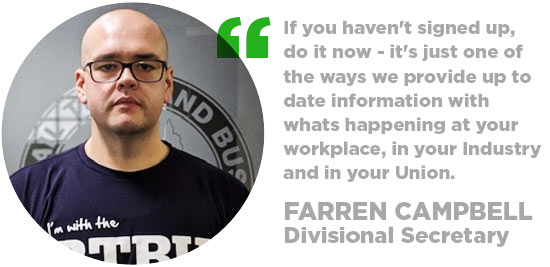The Dangers of Social Media in the Employment Context
(Article thanks to Michael Barnes, from RTBU’s legal firm Carroll & O’Dea Lawyers)
Social Media can have a very expansive definition however, for our purposes, we will limit Social Media to user-generated content in an electronic form which is shared with third persons.
It does not matter if those third persons are “friends” or unidentified groups of recipients or individual recipients.
If you, as the user, are sharing your opinions in relation to any aspect of your employment, then you are at risk of having that behaviour scrutinised by your employer and having adverse opinions formed against you.
You are at risk of your behaviour being grounds for the termination of your employment.
Employees need to be mindful:
- They remain accountable to their employer for aspects of their conduct outside the workplace if there is sufficient connection between the conduct and their employment;
- Case law has established a sufficient connection exists if the employee has made comments about their employment including comments about the employing entity itself or members of staff.
- Employees do not necessarily have control over who may access what has been put on social media. Perhaps a “friend” is no longer a friend and they determine to release the information to the employer or other employees.
Venting about what is happening in the workplace when you are simply talking to a close family member at home is completely different from putting that same content on social media.
Case law has been developing in this area over a number of years and it is no longer remarkable that there are cases relating to termination of employment following employees’ use of social media and endeavours by such employees to bring claims for unfair dismissal.
What is, on one view, remarkable, is that employees are not more aware of their vulnerability and potential exposure when they use social media.
In a matter involving a Mr Little, it was established that Mr Little was sharing opinions with a cross section of persons on the employer’s official Facebook page, which included fellow employees.
He sought, in part, to defend his position by claiming what he had communicated was simply a joke.
However, it was contrary to the employer’s social media policy which provided, in part, the use of social media websites should be limited to work purposes and misuse will not be tolerated. Such misuse included using the site for personal use during work hours or making disparaging comments about co-workers, managers and customers or the employer online.
It was noted in the decision even if the employer had no policies, one hardly needed written policies or a code of conduct to understand and appreciate:
- The kind of sexual comments that were made about the new employee were grossly offensive and disgusting and were more than likely to cause hurt and humiliation; and
- The comments made by the applicant were likely to adversely impact upon the employee’s relationship with that organisation and damage the employer’s wider reputation.
The fact that the employee made such comments outside of work hours was of no consequence. What is important is whether the conduct, when viewed objectively, is likely to cause serious damage to the relationship between the employee and the employer or damages the employer’s interest or is incompatible with the employee’s duty as an employee.
An individual employee’s intention behind social media posts will not necessarily determine the outcome of any action taken by the employer or of any Tribunal that hears an unfair dismissal claim.
Accordingly, employees need to be cautious when seeking to assert their rights to express an opinion or if they become too caught up in the concept of freedom of speech or freedom of expression. There are real limits on what you may say in person or post on social media.
A prudent employee might ask themselves if they would like to see their post or email on the front page of the daily newspaper. If the answer is no, then don’t post it.
The fundamental lesson is to not use social media for an anti-social purpose.
If you have concerns relating to these issues you should certainly consider discussing them with your Union representatives and of course you are welcome to contact our Michael Barnes for an obligation-free first consultation.
Michael Barnes
Partner
Carroll & O’Dea Lawyers
ph: 1800 816 559



